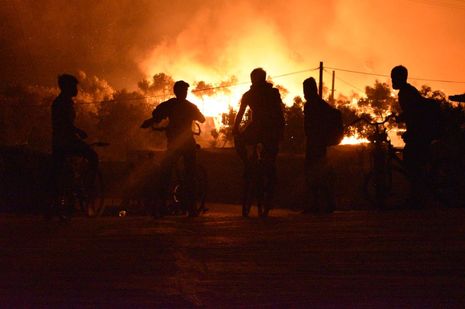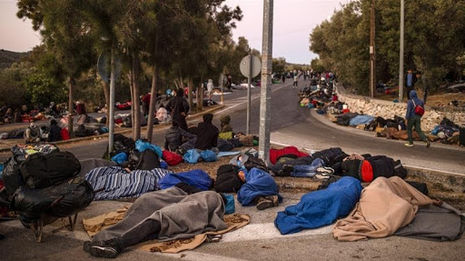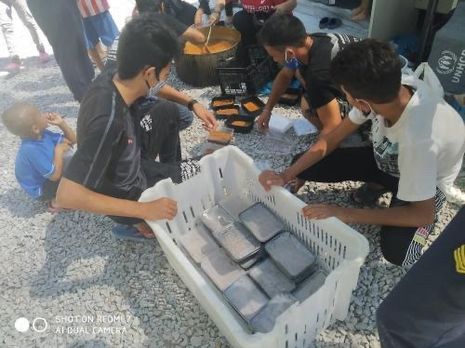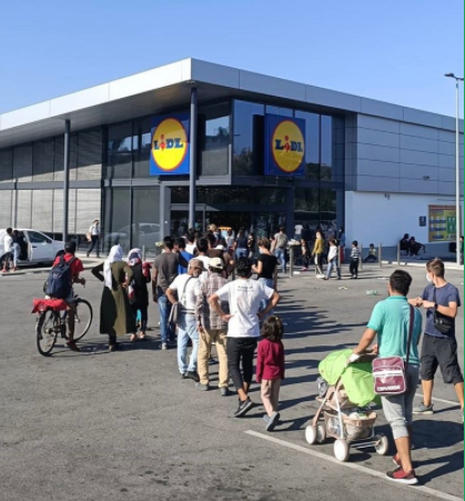Moria fire reveals the more we have, the less we give
Tigs, who spent June and July volunteering in Moria Camp, writes on the recent fire that ravaged Moria camp

It would be reasonable to assume that when someone has more, they should give more. Under this assumption, wealthier states should provide a more generous response to humanitarian crises – especially when those crises happen within their own continent. Even more so when their policies led to the crisis in question.
The devastating fire that ravaged Moria refugee camp on Tuesday 8th and Wednesday 9th September has proved this assumption to be utterly wrong. 13,000 people have been left homeless, and in many cases without any belongings. Important asylum documents, passports, and precious items, which may have travelled across two continents on the treacherous journey to Lesvos, have all been lost.
Shocking images and footage of the fire have spread across social media and mainstream media outlets across Europe. Mothers shielding babies from the smoke; people frantically pushing their elderly relatives in wheelchairs as tents burn behind them; children carrying their entire lives in a bin bag as they run from the furnace. But where is Europe’s response?
Instead of mobilising to send immediate humanitarian response to Lesvos – and promising to relocate desperate refugees from the devastated camp - Europe is collectively looking away. Many European nations were instrumental in forming the migration policies which led to the creation of Moria camp (alongside other closed camps in the Aegean islands). Yet they turned a blind eye to the growing plight of asylum-seekers living in the dangerous, unsanitary conditions as the camps became more and more overcrowded. Now that disaster has struck, their response is no different. Look away. Close our eyes. Pretend these people don’t exist.

Greece is one of the poorest nations in the EU and they are still recovering from deep recession. Since 2016, they have been shouldering the heavy burden of the refugee crisis due to their proximity to Turkey and the Middle East. Their calls on the EU to implement a quota system to redistribute asylum-seekers across Europe have been rejected. In March 2020, EU Chief von der Leyen praised Greece by calling it Europe’s ‘shield’. Such words are damaging in their propensity to paint refugees as invaders – and a meagre reward for the price Greece has had to pay for Europe’s indifference.
European nations – with their combined wealth and political power – should not need Greece to be their shield from the imagined ‘threat’ of refugees fleeing war and persecution. They should be doing the most to help solve this crisis, especially in the aftermath of the devastating fires. Yet they are giving the very least they can get away with.
In reality, those giving the most are those who have the least. Refugees in Kara Tepe camp, only 5km from Moria, have immediately mobilised to help those who have fled Moria. I spoke with Omid, a resident in Kara Tepe, who told me he, his family and his neighbours started cooking food and distributing it to those in need on Wednesday.
After telling me of their plan to distribute food, he said: “Many people, so many people are out [on the streets]. There are many children, many pregnant women. They need care and food; they don’t have anything. Nobody cares, nobody cares. I don’t know why. This is terrible.”

They have now been cooking and distributing hot meals for two days. The army has also begun distributing food at points along the road to Moria, but many people are still going hungry. Police are blocking the road to Mytilini, the capital of Lesvos, which prevents people finding food and other services there. The road block is also preventing NGOs from responding to the need for emergency supplies, despite their efforts.
There has been a blatant lack of emergency response provisions from European governments. A few pledges of relocation have been put forward, but with little sense of urgency or the appropriate scale. Even the local Lidl branch has responded with more care than these powerful nations. They started organising water distributions on Wednesday, and are allowing refugees to use their car park as a temporary place to sleep.
Moria has long been described by residents as ‘hell on earth’. The recent arrival of Covid-19 into the camp was fuel to the flames that were already inevitable given the increasingly desperate and inhumane conditions within the camp.

The shocking contrast between the inadequate response of European nations and the heartfelt response of other refugees on the ground highlights this: the more we have, the less we give. Europe’s ongoing neglect of the people who have sought safety here is shameful, and must be addressed immediately.
(All mentions of Europe/EU in this article include Britain, as Britain was instrumental in the talks in 2016 with Turkey which created the policy of the closed camps on the Aegean islands. Responsibility for past action is not erased by Brexit.)
 News / Fitz students face ‘massive invasion of privacy’ over messy rooms23 April 2024
News / Fitz students face ‘massive invasion of privacy’ over messy rooms23 April 2024 News / Cambridge University disables comments following Passover post backlash 24 April 2024
News / Cambridge University disables comments following Passover post backlash 24 April 2024 Comment / Gown vs town? Local investment plans must remember Cambridge is not just a university24 April 2024
Comment / Gown vs town? Local investment plans must remember Cambridge is not just a university24 April 2024 News / Climate activists smash windows of Cambridge Energy Institute22 April 2024
News / Climate activists smash windows of Cambridge Energy Institute22 April 2024 News / Copycat don caught again19 April 2024
News / Copycat don caught again19 April 2024





